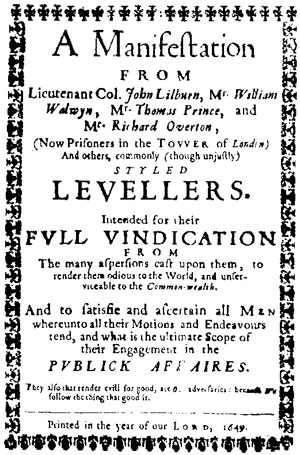Vous pouvez contribuer simplement à Wikibéral. Pour cela, demandez un compte à adminwiki@liberaux.org. N'hésitez pas !
William Walwyn
| William Walwyn | |||||
| pamphlétaire, homme politique | |||||
|---|---|---|---|---|---|
| Dates | 1600-1681 | ||||
| Tendance | précurseur | ||||
| Nationalité | |||||
| Articles internes | Autres articles sur William Walwyn | ||||
| Citation | |||||
| Interwikis sur William Walwyn | |||||
William Walwyn (1600-1681) est l'un des membres du groupe des Levellers.
Présentation
Cadet d'une famille noble, Walwyn fait fortune comme marchand de soie. Devenu partie prenante des Levellers, il accorde cependant moins d'importance que John Lilburne à la Magna Carta, mais plus au concept de l'inaliénabilité des droits naturels.
Le souci principal de Walwyn a concerné la liberté religieuse, ainsi qu'en témoigne son pamphlet The Compassionate Samaritane: Liberty of Conscience Asserted and the Separatist Vindicated (1644) (parfois attribué à son ami Richard Overton), publié en réaction aux velléités presbytériennes d'imposer au pays une Eglise nationale, inspirée de l'Eglise écossaise. De même, tout en restant proche des vues arminiennes, il a pris la défense des calvinistes, en affirmant que la persuasion (donc, l'appel à la raison) doit constituer la seule méthode de conversion à la religion. C'est ainsi qu'il écrit dans son Compassionate Samaritane:
| “ | Si vous employez la loi du bâton, plutôt que de convaincre et d'unir, vous aurez les hommes d'un préjugé contre vous en les amenant à présumer que vous n'êtes nullement assuré de posséder la vérité, car autrement, vous en feriez usageet vous en remettriez à son efficacité, au lieu de lutter avec des armes dont vous savez (ou, du moins, devriez savoir) qu'elles ne sont pas les armes de la vérité. | ” |
En 1649, il est emprisonné, ainsi que les autres Levellers - alors que, contrairement à ses compagnons, il n'avait pas encouragé la population à se rebeller contre la dictature de Cromwell.
Walwyn a été l'un des meilleurs pamphlétaires Leveller. On lui doit notamment: The Bloody Project, un brûlot anti-guerre, A Still and Soft Voice, pour répondre aux accusations d'athéisme.
Œuvres
- A New Petition of the Papists (1641).
- Some Considerations Tending to the Undeceiving Those, Whose Judgments Are Misinformed (10 novembre 1642).
- The Compassionate Samaritane (1644).
- Good Counsell to All (1644).
- A Helpe to the Right Understanding of a Discourse Concerning Independency (6 février 1645).
- England’s Lamentable Slaverie (11 octobre 1645).
- Tolleration Justified, Persecution Condemned (29 janvier 1646).
- A Whisper in the Eare of Mr. Thomas Edwards Minister (13 mars 1646).
- A Word More to Mr. Thomas Edwards Concerning the Nationall Covenant (19 mars 1646).
- A Word in Season (18 May 1646).
- An Antidote against Master Edwards His Old and New Poyson (10 juillet 1646).
- The Just Man in Bonds (29 juin 1646).
- A Pearle in a Dounghill (juin 1646).
- A Prediction of Mr. Edwards His Conversion, and Recantation (11 août 1646).
- A Demurre to the Bill for Preventing the Growth and Spreading of Heresie (7 October 1646).
- A Parable, or Consultation of Physitians upon Master Edwards (29 octobre 1646).
- A Still and Soft Voice (mars/avril 1647).
- Gold Tried in the Fire (4 juin 1647).
- The Poore Wise-man’s Admonition unto All the Plaine People of London and the Neighbour-Places (10 juin 1647).
- The Bloody Project (21 août 1648).
- The Vanitie of the Present Churches (12 mars 1649).
- English Souldiers’ Standard (5 avril 1649).
- The Fountain of Slaunder Discovered (30 mai 1649).
- Walwyn’s Just Defence (juin/juillet 1649).
- Juries Justified (2 décembre 1651).
- For a Free Trade (mai 1652).
Littérature secondaire
- 1955, Joseph Frank, The Levellers: A History of the Writings of Three Seventeenth-Century Social Democrats: John Lilburne, Richard Overton, William Walwyn. Cambridge, Mass.: Harvard University Press
- 1989, Jack R. McMichael et Barbara Taft, “The Life and Thought of William Walwyn”, In: Jack R. McMichael et Barbara Taft, dir., The Writings of William Walwyn, Athens: University of Georgia Press
| Accédez d'un seul coup d’œil au portail sur l'histoire du libéralisme et de la liberté. |
